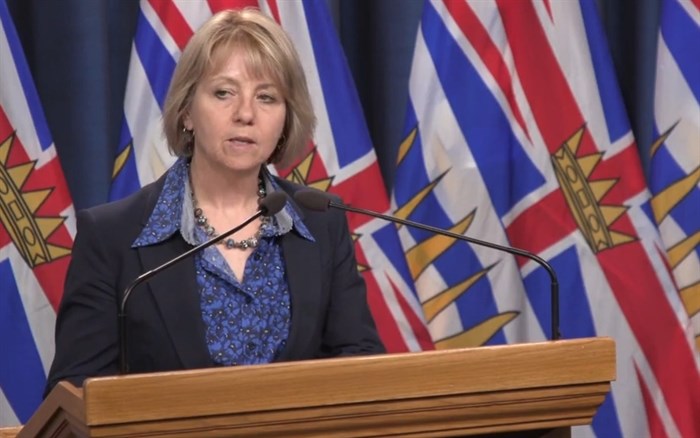
Dr. Bonnie Henry.
Image Credit: FACEBOOK/BC Government
May 19, 2020 - 4:42 PM
Wearing a mask — any mask — should help prevent the spread of COVID-19 during B.C.'s reopening transition, Dr. Bonnie Henry says.
The B.C. Provincial Health Officer hasn't always recommended the use of non-surgical masks to help in the fight — largely because it might create a false sense of confidence and people might not use them correctly — she says her thinking has evolved and there are times when people should wear masks to protect each other as more businesses open up.
“If I’m getting my hair done – which I expect to do, hopefully, soon – I will wear a mask and so will the person who is doing my hair so that we can protect each other for that short period of time when we need to (be close to each other),” Henry said during her daily COVID-19 update today, May 19. “But we’re also going to minimize the time that we need to be in that enclosed space with each other.”
The same may be true for those riding buses and shopping in small stores where people can’t be two metres apart, she added. She stressed that masks are only an addition to things like safe distancing, washing hands, maintaining distance and staying home when sick. They can prevent the mask wearer’s droplets from hitting others but do not protect the wearer from others.
Her comments were made in light of what Health Minister Adrian Dix called a “key transition point” in the province’s fight against the pandemic as stores start to re-open.
Businesses are not being told what specific things they need to do in order to comply with WorkSafeBC guidelines on how to operate safely as they reopen. All that Henry is forcing them to do is write a plan on how they will comply and have that plan posted for the public to see.
Inspections will follow in the due course of time.
If workers feel they are not being protected, they need to file complaints with WorkSafeBC while customers who don’t like how a business operates need to complain to environmental health officers in their local health regions.
The response to those complaints will, first of all, be educational, Henry said.
“Our first line of action is not to fine people or shut them down but to ensure they are taking the necessary actions to make sure people are safe,” she said. “Our first approach is to help people through this.”
This all comes at a time when the number of new cases in B.C. only increased by two in the last 24 hours bringing the total in B.C. to 2,446 with 181 of those being in the Interior Health region.
Still, there were three more deaths during that time, bringing the total in B.C. to 146. All three were from long term care homes in the Lower Mainland. There are still 46 people with COVID-19 in hospitals, 12 of those in intensive care.
Dix applauded the federal government for extending the closure of the Canada-U.S. border to all but essential travel for another month. But, he said, given the problems the U.S. is having with COVID-19, he expects it needs to stay closed for much more than another month.
Henry also shot down a suggestion that the B.C.-Alberta border be closed or that travellers should be screened, saying that’s impractical and, besides, Alberta and B.C. are working closely together to have the same levels of restrictions in place.
To contact a reporter for this story, email Rob Munro or call 250-808-0143 or email the editor. You can also submit photos, videos or news tips to the newsroom and be entered to win a monthly prize draw.
We welcome your comments and opinions on our stories but play nice. We won't censor or delete comments unless they contain off-topic statements or links, unnecessary vulgarity, false facts, spam or obviously fake profiles. If you have any concerns about what you see in comments, email the editor in the link above.
News from © iNFOnews, 2020